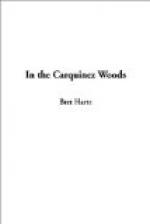“I don’t know that I ever wanted to marry Low, if you mean him,” she said quietly.
“And Dunn wouldn’t marry you now.”
“I’m not so sure of that, either.”
“Nellie,” said Wynn excitedly, “do you want to drive me mad? Have you nothing to say—nothing to suggest?”
“Oh, you want me to help you, do you! Why didn’t you say that first? Well, go and bring Dunn here.”
“Are you mad? The man has gone already in pursuit of your lover, believing you with him.”
“Then he will the more readily come and talk with me without him. Will you take the invitation—yes or no?”
“Yes, but—”
“Enough. On your way there you will stop at the hotel and give Low a letter from me.”
“Nellie!”
“You shall read it, of course,” she said scornfully, “for it will be your text for the conversation you will have with him. Will you please take your hand from the lock and open the door?”
Wynn mechanically opened the door. The young girl flew up-stairs. In a very few moments she returned with two notes: one contained a few lines of formal invitation to Dunn; the other read as follows:
“Dear Mr. Dorman,—My father will tell you how deeply I regret that our recent botanical excursions in the Carquinez Woods have been a source of serious misapprehensions to those who had a claim to my consideration, and that I shall be obliged to discontinue them for the future. At the same time he wishes me to express my gratitude for your valuable instruction and assistance in that pleasing study, even though approaching events may compel me to relinquish it for other duties. May I beg you to accept the inclosed ring as a slight recognition of my obligations to you?
“Your grateful pupil,
“Nellie Wynn.”
When he had finished reading the letter, she handed him a ring, which he took mechanically. He raised his eyes to hers with perfectly genuine admiration. “You’re a good girl, Nellie,” he said, and, in a moment of parental forgetfulness, unconsciously advanced his lips towards her cheek. But she drew back in time to recall him to a sense of that human weakness.
“I suppose I’ll have time for a nap yet,” she said, as a gentle hint to her embarrassed parent. He nodded and turned towards the door.
“If I were you,” she continued, repressing a yawn, “I’d manage to be seen on good terms with Low at the hotel; so perhaps you need not give the letter to him until the last thing. Good-by.”
The sitting-room door opened and closed behind her as she slipped up-stairs, and her father, without the formality of leave-taking, quietly let himself out by the front door.




